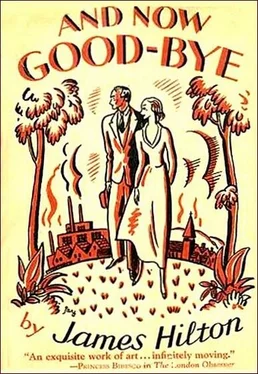“If I’ve done to you what you’ve done to me, then I’m glad.”
“But I can’t go back now! Do you realise that?”
“To your hotel? Well, it doesn’t matter. You can stay here. We can talk. I’m not sleepy.”
“It’s—it’s more than that I mean. Much more. I’m thinking of Browdley…Oh, Elizabeth, I wish I’d known you years and years ago!”
“Before I was born, that would have been!”
“Yes, I know. It’s monstrous, I admit—a child like you and a man of my age. With a wife—children—and—and a chapel! My God, a chapel—think of that! Tell me, how much does all this mean to you? How long will it last? I want to know—is it just a fancy—the sort of thing you feel in the mood for after Brahms? How much exactly does it mean?”
She touched his forehead and then his hair with ’her fingertips. “Everything, Howat. There’s only one thought in my mind, and that’s how much I could be to you if you wanted me. Howat, I’m not afraid.”
“ You’re not afraid! ” He drew her to him exultantly and kissed her in the flush of splendour that her words had evoked. “Elizabeth, do you mean that-absolutely? You strange girl—you’re so cool and calm all the time, and it’s all so marvellous—the most marvellous thing that’s ever happened to me. Do you think I could dare to let it go now?”
“Not if you feel certain that it’s everything. I’m certain, in my own case, because I’ve never felt anything like it before. That makes it so simple. But you, of course—”
“And do you think I ever have, either?”
She gave him a single fearless glance that made him certain that there was nothing in his life beyond her instant comprehension. “Haven’t you?” she said softly, and he shook his head, knowing that she would understand how true it was. Never before had there been in him this curious ache that made him feel almost raw with tenderness at the sight of her fingers stretched out on the arm of the chair or the delicate curving of her nostril or the little side-tooth that wasn’t quite in line with the others. He said, abruptly: “You were right when you said I’ve not been happy. I’ve had some bad times. Did you ever hear about my two boys? One died when he was twelve—he would have been clever, I think, especially at music. The other, the elder, wasn’t so clever, but he was a dear fellow—a bit wild at times, but there was no harm in him—oh, no real harm at all. He didn’t like Browdley, and he was rather bored at home—we got him a job in a bank, but he wouldn’t stay—he went off to Canada then—I haven’t had any letter for three years. Perhaps I’ll see him again sometime.”
“You were very fond of him?”
“Yes.” He added, fiercely: “He went off because he couldn’t stand it. The routine of the bank, and then the routine of home life—the chapel services and everything else—I can see now, I ought to have taken his part more than I did. He told me, before he left, that he couldn’t stand it. And I can’t stand it now, either. The very thought of it turns me cold—to leave you and go back to that life—my God, I can’t do it, Elizabeth. Do you think I ought to?”
“Do you think I want you to?”
“But ought I— ought I?”
“I don’t think I’m ever sure what other people ought to do, Howat.”
“That being more in my line of business, eh?” He laughed sharply. “It used to be, but it isn’t any more. I’ve found myself out. I see my chance now, just as you see yours. I want to take it—oh, I want to take it so much—”
“And I want everything that you want—everything you could possibly want.”
“I want you —I want—oh, my darling, we’ve only our two lives and they belong to us more than to any other person—shall we run for those lives of ours?”
“I know what you mean, Howat. I feel it, too—I feel it just like that—it’s curious and rather dreadful, yet it makes me very happy.” She stooped and laid her cheek against his. “I’ve thought of it all, as well as you—probably long before you did, really even to working out details. During dinner while we were talking I kept thinking of it all, though it seemed such absolute nonsense then.” She smiled and went on softly: “I was imagining the two of us in Vienna together. Some big comfortable room with a piano in it, where you could compose when you felt in the mood, and I could fiddle away. And again later on, while I was making the coffee, I thought of it—a room perhaps something like this, though with a real fire for preference, and all kinds of interesting people dropping in at odd times to see us, and then afterwards, when they’d gone, being by ourselves—and drinking coffee—and talking—oh, plenty of talk—there’d always be that, wouldn’t there? Howat, I can see it just exactly as it ought to be—why couldn’t it all happen to us?”
He turned to her with a look of worship; he too was entranced by the imagined picture of that room, and as for the music he would compose, it was in his cars already. “It shall happen,” he whispered, and there stole over him again that divine tenderness for her, making him aware, even had he not earlier guessed it, that there was still something more; it was not enough to have found the meaning of love, since on the very crest of discovery a further peak swung into view.
He kissed her and whispered again, with this new certainty of desire: “It shall happen,” and felt her tears warm and then cool upon his face.
Later he began to tell her about his early life at Kimbourne…
It was early in the century when he had first arrived there. He was sixteen then, a tall thin youth wearing a grammar-school cap of exuberant hues that aroused the liveliest conjectures in the little Kentish village. His father, after losing money in rash speculation, had been killed in the South African War, and his mother had survived her husband by barely a year, having tried vainly in the meantime to retrieve the family fortunes by running a seaside boarding-house. The lawyer who wound up the estate had not known quite what to do with Howat; he thought him a nice-looking and decently-educated youth, but rather young to be flung into the world entirely on his own; clearly it would be a good thing if he could be got into a family for a few years; he would probably earn his keep, at least, as soon as he was put to work. It so happened that about that time the lawyer was visiting a client of his, a Mr. Coverdale, who was noted as a very religious and philanthropic person; he mentioned Howat’s case, and Coverdale suggested that the boy should come along to Kimbourne, at any rate for a short holiday.
Howat walked from the station on a blazing June afternoon. Coverdale’s house was about a mile out of the village a pleasant detached property with verandahs and low windows and a big garden full of flowers; the path from the garden gate to the porch was through an avenue of tall hollyhocks. Howat was hot from the walk, and he was also very shy. The house seemed grand to him after the miserable boarding-house basement, and he felt shyer than ever when a rather plump and cheerful-looking woman introduced herself as Mrs. Coverdale and asked him if he had had tea. He said no, and she took him into a room which, to his rather faltering eyes at that first sight of it, seemed entirely full of girls.
There were, indeed, seven of them, and they were presented one after another. Howat was struck almost completely dumb; he had never had anything to do with girls, and didn’t know in the least what to say to them. He merely answered their questions when they asked if the train had been late, and whether he liked the hot summer; for the rest of the time he sat silent and uncomfortable. They chattered loudly all around him, and he wondered if it would be very rude to ask permission to go to his bedroom and wash, but he was too nervous to do so, and he actually made up his mind to run away to London the following morning after breakfast. Soon, however, the girls disappeared in ones and twos, leaving him alone with Mrs. Coverdale. He was not so nervous with her; she had a very genial and easygoing manner, and asked him scores of questions about himself, what his tastes were, what subjects he had liked best at school, and so on. He told her he liked music, and she said: “Ah, Mr. Coverdale will want you to play the harmonium this evening, then.” The thought of that made him nervous again, and he wished he had said nothing at all about music.
Читать дальше











